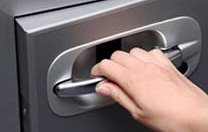 This story over at New Scientist seems a bit optimistic. Apparently Hitachi has developed a biometric device that reads the pattern of finger veins in your hands as you tug at your car door handle, unlocking the door if the correct hand is doing the tugging.
This story over at New Scientist seems a bit optimistic. Apparently Hitachi has developed a biometric device that reads the pattern of finger veins in your hands as you tug at your car door handle, unlocking the door if the correct hand is doing the tugging.
In general biometrics have one or two benefits and a host of drawbacks. In this case the benefits are that it’s hard to pretend to be the owner of a particular hand when you’re not, and that you can’t lock your hand inside your car by accident.
The drawbacks tend to centre on problems like being locked out because you have a bandage on your thumb, or being refused entry because your hands are dirty, or simply not being recognised because there’s road-grime or bird-shit on the sensor. Or because it’s freezing cold and your finger veins have shrunk. Or, for that matter, because it’s freezing cold and you’re wearing gloves.
Never mind that biometric systems tend to have a failure rate even under optimum conditions that you just don’t get with a metal key.
This seems like an innovation with more drawbacks than benefits. Of course Hitachi probably doesn’t really mean to sell this thing to carmakers, but is showing the system off at the Tokyo motor show to get a bit of publicity. Significantly, it looks like the hand in Hitachi's picture is opening a freezer door. Guarding the ice cream – now that’s the kind of job that you can trust to a biometric sensor.
skip to main |
skip to sidebar
Most Popular
-
Mercedes-Benz C 220 CDI review – Executive SE edition
-
Audi A1 and A3 to get half an engine
-
Facelifted Golf GTD is both better and worse
-
Rising star: Mercedes C220 BlueTec review
-
Range Rover Evoque review – eD4 and SD4 editions
-
Mild-mannered hybrid: Kia Sportage 48V driven
-
Lexus GS 450h review
-
Renault Scenic versus Citroen C4 Picasso
Browse by Brand
Most Recent
 © 2005 to GreenMotor.co.uk | Contact | Terms & Conditions | Cookies | Privacy | Powered by
© 2005 to GreenMotor.co.uk | Contact | Terms & Conditions | Cookies | Privacy | Powered by  | Close
| Close

